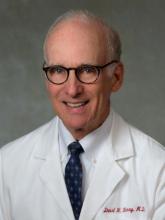Chimeric antigen receptor (CAR) T-cell therapy is one of the hottest advances in lymphoma treatment, but who should get it and what does the process look like? Allison Winter, MD, of the Cleveland Clinic helps answer those questions on the podcast. She joins Blood & Cancer host David H. Henry, MD, of the Pennsylvania Hospital, Philadelphia, to break down the side effects and look ahead to possible off-the-shelf products.
In Clinical Correlation, Ilana Yurkiewicz, MD, of Stanford (Calif.) University discusses optimism bias. She recalls a time when a patient’s drive for optimism affected what she told them and whether that was a good or bad thing.
Practice points:
- The time to refer a patient for CAR T-cell therapy is at relapse.
- CAR T-cell therapy side effects are serious and include cytokine release syndrome and neurotoxicity.* * *
CAR T-cell therapy use in lymphoma
- For patients with diffuse large B-cell lymphoma, treatment after relapse typically involves salvage therapy, and if they are chemotherapy-sensitive, autologous transplant.
- The time to refer a patient for CAR T-cell therapy (or other clinical trial options) is at the time of relapse.
- CAR T cells are currently approved after two lines of therapy.
- What is the process for a patient to get CAR T-cell therapy?
- Evaluation by physicians.
- Approval of insurance.
- Collection of the patient’s T cells.
- Shipment of T cells for genetic modification (takes several weeks).
- Reception of genetically modified T cells by patients.
- Administration of lymphodepleting chemotherapy.
- Admission to the hospital for CAR T-cell infusion.
- The median time to get CAR T cells is 26 days.
- Allogeneic CAR T-cell products (called off-the-shelf) are in the clinical trial stage.
- The two major side effects of immunotherapy include cytokine release syndrome and neurotoxicity.
Reference:
Axicabtagene ciloleucel CAR T-cell therapy in refractory large B-cell lymphoma. N Engl J Med. 2017 Dec 28; 377:2531-44.
* * *
Show notes by Emily Bryer, DO, resident in the department of internal medicine, University of Pennsylvania, Philadelphia.
* * *
For more MDedge Podcasts, go to mdedge.com/podcasts
Email the show: podcasts@mdedge.com
Interact with us on Twitter: @MDedgehemonc
David Henry on Twitter: @davidhenrymd
Ilana Yurkiewicz on Twitter: @ilanayurkiewicz

